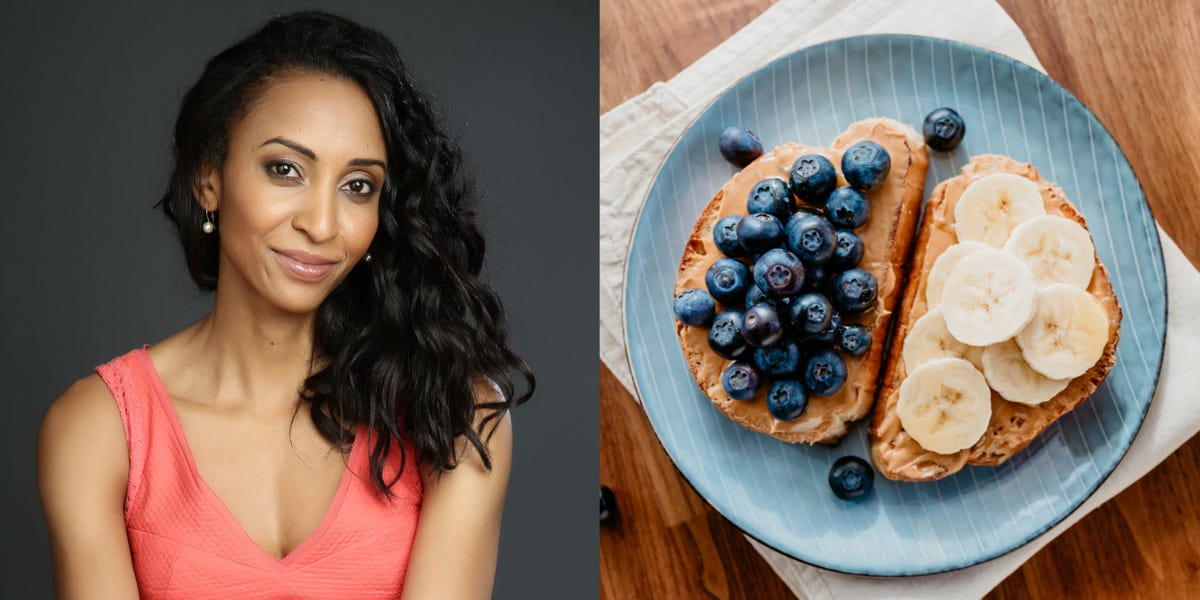- Eating a lot of processed foods has been linked to many health problems.
- Dietitian and UPF researcher Linia Patel limits her intake by using the so-called 80/20 rule.
- Her favorite minimally processed breakfast is overnight oats and toast.
A dietitian who studies ultra-processed foods and limits her intake shared her three favorite minimally processed breakfasts with Business Insider.
UPFs contain ingredients that you won’t find in a regular kitchen and are made using industrial processes. They tend to be ultra-tasty, convenient, and highly manufactured. More than half of the average American’s calories come from UPFs, and eating a lot of UPFs has been linked to health problems including obesity, type 2 diabetes, and depression.
Dietitian Linia Patel is part of a team at the University of Milan investigating ways to address the limitations of the classification of UPFs and their association with chronic diseases.
She believes that people are getting “way too much” UPFs, but that we shouldn’t focus too much on the UPF category itself, as it also contains a number of basic nutrients.
“It puts breakfast cereals in the same category as sugary drinks and potato chips,” said Patel, author of “Food For Menopause.”
Instead, people should focus on making meals as nutritious as possible by eating plenty of fruits, vegetables and whole foods and, if possible, cooking for themselves.
To achieve this, Patel follows the 80/20 rule, meaning she eats healthy 80% of the time, consisting mainly of whole foods, and the other 20% she eats whatever she wants.
“That could be added sugar, that could be ultra-processed foods. But I do it completely guilt-free,” she said. This helps her use less UPFs without restricting herself too much.
“A long-term healthy diet is about a nutritional approach that looks at the diet as a whole,” she said.
With that in mind, Patel has three set breakfasts that she alternates so she doesn’t get bored.
Overnight oatmeal
Patel is a big fan of oatmeal because it is high in fiber and contains slow-release carbohydrates, which give her long-lasting energy, she says.
She loves making overnight oats and filling them with nutrients and protein. She mixes the oats with soy milk and adds Greek yogurt for protein and for her gut health because it is a fermented food that contains probiotics.
She also sprinkles a generous amount of chia seeds on top to increase the fiber content of her oatmeal, and berries for micronutrients.
She said replacing sugary yogurt, which is typically highly processed, with Greek yogurt with fruit can be a good way to reduce UPF intake.
“Start thinking about how you can easily switch to something that’s less processed,” Patel says.
Eggs and avocado on toast
Patel recently started baking bread. Because toast is quick and easy to make, she regularly eats it for breakfast.
When she buys bread, she chooses sourdough bread because it is fermented, or whole wheat bread with seeds.
“Sometimes I’ll boil eggs while I’m in the shower, mash some avocado with them and put it on toast,” she said.
Eggs are a good source of protein and vitamins, and avocados contain healthy fats, fiber and antioxidants.
Nut butter and fruit on toast
When she’s craving something sweet, Patel eats toast with nut butter and fresh fruit. She chooses a nut butter bread with the shortest ingredient list.
Nuts are a good source of protein and nut butters are considered processed, not ultra-processed, she said.
And instead of jam, which contains a lot of sugar, she tops her toast with slices of fruit or mashes some raspberries on it.
